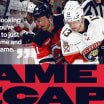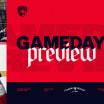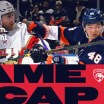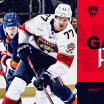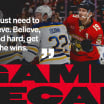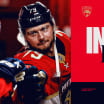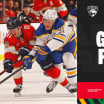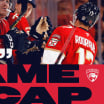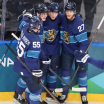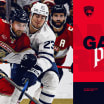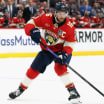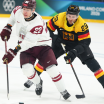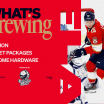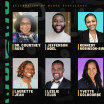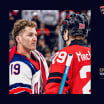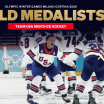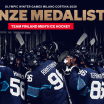It's shaping up to be a road trip full of milestones for the Florida Panthers, who have jumped the first hurdle on their current five-game swing with a 5-4 win last night in Nashville. Mason Marchment netted his first National Hockey League goal on a night when Radko Gudas was skating in his 500th NHL game, one game after Aleksander Barkov played his 500th game! Keith Yandle is expected to play in career game number 1,000 on Sunday at Carolina as well. Huge congratulations are in order to each of them!
Milestones like these are never to be taken lightly. As far as I'm concerned, one of the greatest parts, and honors, of being a broadcaster is being able to see, on a daily basis, the dedication to the craft that professional hockey players have. The attention to detail, ability and willingness to play through inevitable bumps and bruises, and the perseverance that's required by any athlete to reach the highest levels is something that we, as fans of the game, have to appreciate.
Doug Plagens' Panthers Mailbag Volume Four
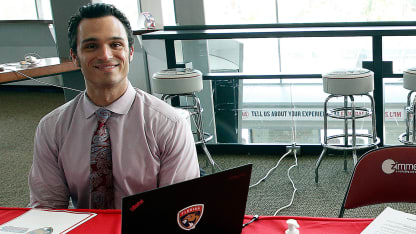
That said, I've been asked many times what my favorite part of calling hockey games is. There are a TON of things I love about the job, but usually the first thing I think of is being able to call a player's first NHL goal. To call it a special event is an understatement, and regardless of the road a player took to reach the highest level, there's just something about the celebration, the player's smile, and their facial expression that exhibits a snapshot of a lifetime of work that led up to that unforgettable moment.
In Marchment's case, you had to feel that first goal coming (I called it on Territory Talk this week!). He had assists in three straight games- on some huge goals, nonetheless- and was helping generate scoring chance after scoring chance. He's making a big impact for the Panthers over the last week, and is proving to be a key part of one of the league's deepest lineups.
Now, it's that time again… Time for your questions!
@hlamp: #DearDoug This is what I need to know. What do you do if you lose your voice? Do you memorize all the hockey players and their number, in other words, can you call a game if the players name was not on the jersey?
A two-parter! I'll start with part one… the losing the voice part! First of all, hopefully I don't lose my voice! However, having done this professionally for 13 years, it has definitely happened. That said, I've never missed a game (Knock on wood).
Two examples: during the '11-12 season, I was working for the American Hockey League's Lake Erie Monsters, and I lost my voice. I would say my vocal capacity was about 25%. With help from throat drops, tea, lemon juice, and virtually every age-old home remedy possible, I was able to at least make it possible to talk for a full game. I sounded awful, and it was actually painful to talk, but I couldn't miss a game.
The most extreme example of having to "play through pain" would have been as a 23-year-old during the '08-09 ECHL season when I was broadcasting for the Idaho Steelheads. Prior to game one of a three-games-in-three-nights road trip against the Stockton Thunder, I developed a terrible sore throat, and as the weekend progressed, I felt just horrible. Regardless, I battled through the three games solo, hosting my own pre-game, intermissions, and post-game shows in addition to calling the games themselves. I couldn't get much strength behind my voice, and knew that something just didn't feel right.
As soon as we returned to Boise, I went straight to a 24-hour clinic to get the lowdown. That was when I learned that I had just called three games in three nights with… mono and strep throat! That was not fun, to say the least! And these experiences are why my laptop bag that I carry with me to every game also contains what's basically a travel pharmacy, just in case. Again, knock on wood, I've never missed a game that I was scheduled to broadcast.
And part two: fortunately, I've always had a pretty good mind for remembering jersey numbers and being able to associate them with names. The first couple seasons of hockey play-by-play I did was on my campus station, 88.9 WMXM, when I was a student at Lake Forest College in Illinois. I'm not sure there was a team that wore names on their backs; maybe that's what helped me develop the skill. Everyone has their different systems of identifying players, and I've always been a numerical roster guy. Since I first started in the ECHL, I've always taken the front sheet of the game notes- the page with one team's roster on the right and the other team on the left- folded it vertically in half, and off I go.
@fakejedega: #deardoug have you ever had a players name you couldn't pronounce? How do you then get the info for the correct way to pronounce their name?
There have been some difficult ones over the years, without question! If I run into a tougher one, I usually stare at it for an extra couple minutes and say it a bunch of times, and I'm usually fine. I remember the first time I saw Andreas Athanasiou play in the AHL as a member of the Grand Rapids Griffins… and they put him on a line with Andrej Nestrasil. "Nestrasil-to-Athanasiou" is a mouthful at first, but after a couple shifts, it really wasn't too bad!
The best ways to get a proper pronunciation are as follows: asking the player directly is the best, by far. If we don't have time to ask the player- for example, if he's called up and doesn't arrive until shortly before game time- our outstanding public relations department, or the other team's broadcaster if it's an opposing player, are the go-to sources. Another option that's become increasingly popular: pull up a YouTube highlight from the player's AHL or major junior career, and listen to how the broadcaster said it. Usually, at least one of those options will be available before a game!
@Jreidy56: What are your top 3 resturants/meals when on the road in NHL cities?
Narrowing it down to a top three is difficult, but this is a great question. Some individual cities have such great dining options that choosing a top three in one city can be tough; like Chicago, for example, which I believe to be the best overall restaurant city in the country.
Number one, for me, is what I consider to be the best food in the world, though: In-N-Out Burger. Yep, if I had one meal left on Earth, that's what I'd want. Fortunately, six Western Conference markets have In-N-Out, so I'm able to go pretty often throughout the season.
After In-N-Out Burger, the next spot would go to Sauce On The Side, a local St. Louis chain of calzone establishments. They have a full menu of calzones, with a monthly special calzone and a vast array of traditional calzones, and some really outside-the-box calzones. They even have dessert calzones! Each calzone comes with a different type of "Sauce On The Side", hence the name. I've recommended this place for years, and if anyone is passing through St. Louis, you have to go! I discovered it on #BaseballTrip15; my friend Adrian Denny (Voice of the AHL's Tuscon RoadRunners) were wandering around Downtown St. Louis before a Cardinals game on July 4th, 2015, and stumbled upon it.
The third spot will go to Dinosaur BBQ; they have locations throughout New York and New Jersey, so I'm able to go in Buffalo and Newark. I've had a lot of BBQ in my time, and I'm not sure I've had better than Dinosaur. As a grad student at Syracuse, I was able to go to the original Syracuse location, and in the AHL, I was able to visit the Rochester location (Which I consider my favorite one).
Honorable mentions, partially because there are several eateries where I love these specific items: multiple Chicago Italian Beef Sandwich establishments, and multiple cheesesteak shops in Philly.
@HardleyKurt: #DearDoug What is your most expensive sports trading card, your oldest card and what is your favorite card?
I love talking sports cards! I'll break my answer into the three categories below:
My most expensive card is a 1979-80 Topps Wayne Gretzky rookie card. I'm actually working on piecing together the full timeline of Gretzky base Topps cards. Needless to say, it's also one of my favorite cards, but two others stick out…
My favorite card is a tie. One of the best parts of collecting cards is remembering the story surrounding when and where a card was obtained, whether it was purchased as a single or pulled from a pack, and both cards involved here were acquired on fun trips that my dad and I took to the National Sports Collectors Convention back in the '90's. One is the card of my youth, and what I still consider to be one of the most iconic cards in the history of the hobby, the 1989 Upper Deck Ken Griffey Jr. rookie card. I'd even argue that it's one of the most recognizable cards in history; a lot of people who don't collect cards can picture that card! The other is the 1989 Score Barry Sanders rookie card. I'm a lifelong Lions fan, so that card was always one of the centerpieces of my collection. Plus, those green '89 Score borders chipped really easily, and they were very tough cards to find in great shape! Both cards have stood the test of time for me, and for the collecting world, and both players are legends.
Regarding my oldest card, I'll preface it by saying that a goal of mine in the next year or so is to pick up some vintage cards that I've had my eye on. I love the designs of 1958 and 1959 Topps baseball, so I'd love get a few singles from those sets. I'm eyeballing a few Sandy Koufax and Al Kaline cards, as well as the '59 Topps George "Sparky" Anderson rookie card. I also love 1951-52 Parkhurst hockey, and would like to pick up a few of them; even just commons. That said, my oldest cards are my 1964-65 Topps Roger Crozier rookie card and my 1965 Topps Denny McLain rookie card. Crozier was the Calder Trophy winner as the rookie of the year in 1965, and has the rare distinction of winning a Conn Smythe Trophy as playoff MVP despite not winning the Stanley Cup in 1966. The '64-65 Topps hockey set was made in the "Tall Boy" style. McLain was a Tiger, part of the iconic 1968 World Series team, plus I feel pretty confident in saying that he'll go down as the last 30-game winner in MLB history. His '65 Topps is a really cool card of a guy who has a unique spot in baseball lore as a modern 30-game winner.
As always, thanks everyone for the great questions! If you didn't see yours, it may appear in a future edition!

